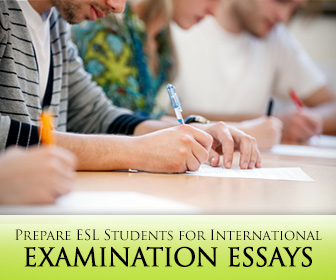If you teach ESL students, there’s a chance that they will be sitting for an international examination, like any of the Cambridge ESOL exams or the TOEFL.
Each test is different, but most offer multiple choice sections for grammar, vocabulary and listening, an interview to evaluate speaking, and a writing task. A writing task they must really practice for. How can you guide them, not only towards a better score but also to improve their writing in general? Let me take you step by step:

How to Prepare ESL Students for Examination Essays
-
1
Familiarize Yourself with the Examination
If you’ve never prepared students for a particular examination, there is a fair amount of research you have to do on it. Don’t make the mistake of thinking they’re all similar. In many ways they are, but each has its particular set of requirements or grading standards. For example, say you’ve prepared hundreds of students for the First Certificate in English (FCE), and now you have a group that is preparing to sit for the Certificate in Advanced English (CAE). In both cases, students must produce two pieces of writing, but upon closer inspection of the exam handbooks, we see that the CAE requires students to write longer texts and prove their ability to not only describe, explain or give information (also required of the FCE) but also persuade or justify, which requires more sophisticated writing skills.
To obtain the information you need, go to the source, for example the Cambridge English website. They provide handbooks for each of the Cambridge ESOL examinations and plenty of resources for teachers.
-
2
Seek out Samples
There are countless books and websites that provide samples of not only typical essay topics but also the type of writing students are expected to produce. Of particular use, are the “Sample answers with examiner comments” (for an example see the KET Handbook provided by Cambridge English). These are invaluable resources. You may think your student’s writing is good, but it may not be what is expected for a specific examination.
-
3
Find out the Assessment Criteria
One of the hardest things about preparing students for the essay portion of a test is not knowing how it will be marked. If you take a look at the FCE Handbook, you see that the assessment scales used for marking evaluate the candidate’s use of language and ability to organize the text, but also evaluate content and communicative achievement, i.e. if the candidate answered the questions or addressed the issue.
-
4
Give them Opportunities to Practice
Students who are preparing for international examinations spend hours taking and retaking the multiple choice portion of the test. After all, this is something they can easily do at home on their own, And they’re able to check their own answers. This enables them to take as many practice tests as they want. But they are not able to evaluate their own writing. They’ll need you for that.
-
5
Put in the Work
Let’s be honest. It’s a lot easier to give your class copies upon copies of the multiple choice section of the test because it’s a lot easier to grade. The more essays you assign, the more you’ll have to correct, and you have to do it with the exam’s assessment criteria in mind. I’ve been there, and it’s not easy. Depending on the size of your class, you could be faced with hours of extra work. Resist the urge to focus mostly on practicing grammar and listening, and do what it takes to help your students improve writing, too.
-
6
Consider the Bigger Picture
You’ll be teaching students strategies that can help them improve their scores. But don't lose sight of the bigger picture. And what is that? Glad you asked! The bigger picture is that they learn writing skills that will help them whenever they need to communicate in writing - not just to do well on the test. As you practice with sample questions, try to make them relevant to their lives; ask them to write letters or emails they can see themselves writing to a friend. For essay questions, choose topics that engage them, things they are interested in, and help them see how the type of language used will be useful for them in the future (academic writing, business reports, presentations, etc...)
A lot of ESL students struggle with writing.
Most don’t feel confident they can produce a solid piece of writing. Yet, the written section will provide only one fraction of the total score (in most cases, 20% or less of the total marks). The important thing here is not the percentage or score. The important thing is that you take this opportunity to teach and practice writing skills that will be useful for them - always.
I have a great deal of experience in preparing students for the Cambridge ESOL exams and TOEFL. What about you? Do you often prepare students for international examinations? Which ones? Share your experiences in the comments below!
P.S. If you enjoyed this article, please help spread it by clicking one of those sharing buttons below. And if you are interested in more, you should follow our Facebook page where we share more about creative, non-boring ways to teach English.







